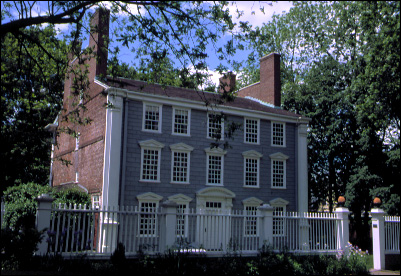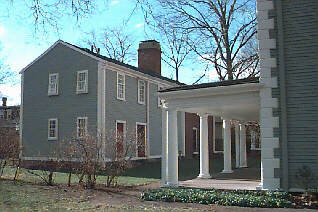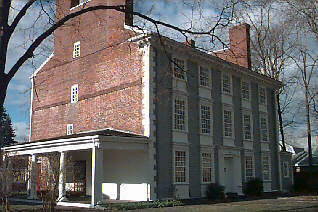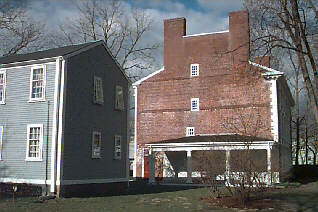
 |
The privileged lives they led and left behind on Evacuation Day, March 17, 1776, can still be visited on an informal ''Losers' Trail'' that stands in contrast to the winners' Freedom Trail. On it are mansions that were attacked by rebel mobs, another where the family hid its wine (and perhaps the children's toys) in hopes of returning, and even a tavern that gave tea and lodging to British spies. The trail starts - as those Loyalists would probably have wished it to be - at the seat of the royal government in the Massachusetts colony, the Town House, known now as the Old State House. As historian Colin Nicolson notes, virtually all the Loyalists who fled from their estates to Boston - and later fled their nascent country as well - had held important positions in the royal government of Massachusetts. The Tories, like the colonists who became leaders of the Revolution, ''considered themselves loyal to the political culture and traditions of Britain,'' says Nicolson, a lecturer at the University of Stirling in Scotland and author of a newly-published biography of royal Governor Francis Bernard, ''The `Infamas Govener.''' The Loyalists called themselves ''friends of government,'' Nicolson adds, to distinguish themselves from the political radicals.
 |
 |
Even more dramatic stories of escape into Boston can be told of the Ropes family from Salem, the daughter and son-in-law of Governor William Shirley from Roxbury, and the seven Loyalist families who lived on Brattle Street, Cambridge's ''Tory Row.'' Many of them fled after their houses were attacked by angry crowds of anti-British protesters. Thomas Oliver had been appointed lieutenant governor in 1774 to head the Mandamus Council. In September 1774, a mob stormed down Brattle Street to his mansion, Elmwood, demanding he resign his position. After some five or six hours, he signed a letter of resignation, ending it angrily: ''My house at Cambridge being surrounded by about 4,000 people, in compliance with their demands, I sign my name.'' Within days, the family fled into Boston where Oliver continued to serve as lieutenant governor until the evacuation.
Perhaps the most intriguing event associated with these Loyalist sites occurred at a Colonial tavern in Weston, the Golden Ball. In February 1775, Governor Gage dispatched three spies, two officers and an enlisted man disguised as farmers, to scout out a route that British troops could safely follow to Concord and Worcester, where the patriots had collected supplies of arms. They got no farther than Watertown before local people saw through their disguises. But they persisted, on foot or by hitching rides in farm wagons, until they reached Weston, where they stopped at the Golden Ball Tavern. Its landlord, Isaac Jones, a wealthy merchant, indicated his Loyalist sympathies when he offered them ''what we pleased,'' one of the officers wrote, ''either tea or coffee.'' By including tea in this simple gesture of hospitality, Jones communicated what had become something of a Loyalist password since the Boston Tea Party, 14 months earlier. He also put them up for the night. Jones lost his license to operate the Golden Ball for a time, but apparently he quietly changed sides because it was later restored and by 1778 he had been elected a selectman for Weston. Two years later he won a large contract to haul supplies for the Colonial army's French allies. The British forces never made it to Worcester, but in January 1775, Gage sent some hundred troops, by ship, to Marshfield to protect some 240 ''loyally disposed people'' who lived there and in Scituate. Among them was Nathaniel Ray Thomas, one of the appointed Mandamus Councilors, and Isaac Winslow, the town's doctor. After news reached Marshfield of the battles at Lexington and Concord, the British troops were recalled to Boston, followed by Thomas and some other local Loyalists. Winslow was allowed to remain, perhaps because he was a physician.
Fortune was not always kind to the Loyalists who fled Massachusetts. Many settled permanently in Canada, while others continued on to England where they spent the rest of their lives seeking reimbursement from the British government for their lost properties. One who prospered was Benjamin Thompson. He was born in a small farmhouse still standing in Woburn and ended his life as Count Rumford of the Holy Roman Empire, with a statue in Munich. Only 22 years old when the Revolution began, he secretly supplied British commanders with information about antigovernment activities. He later organized a Loyalist cavalry regiment in Canada that fought in New York during the war's closing months. After the war, he turned his mind to experiment and invention - measuring heat radiation, designing an efficient oven and fireplace. Although he left behind no grand mansion, his likeness can be found on pantry shelves - on cans of the baking powder he popularized and which bear his name.
 |
 |